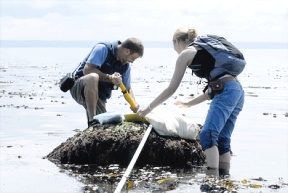FREELAND — After walking 20 minutes down the beach at Double Bluff under a searing sun toward a small group of research students, one could see why University of Washington students would enjoy a field trip to Whidbey Island.
Clinton resident Terry Swanson, a senior lecturer in earth and space sciences at the university, and Heather Rogers, a graduate student of geology, both stood knee-deep in calm water next to a seaweed- and barnacle-encrusted boulder.
They were taking samples of the stone that eventually, when tested at the Cosmogenic Isotope Laboratory back in Seattle, will tell Rogers how much Beryllium 10 was present.
Beryllium 10 is a trace isotope that exists after cosmic rays strike the earth. And in turn, the reading will tell Rogers approximately how long the boulder has rested in its present location. That clue could lead to an idea of when the bluff retreated from the rock to its current position.
Rogers is testing the method as a more accurate way to date land-form evolution than the well-known radiocarbon dating method.
For Swanson, the research Rogers is conducting at Double Bluff and other areas around Whidbey Island has important implications for development on the island and beyond.
“You’re getting more and more people building in geologically hazardous areas just because the easily-buildable lots or ones that clearly have a stable shoreline have already been taken,” he said.
“Her research will be very important because this is Whidbey Island but this will be applicable to all soft-sediment bluffs along the Puget Sound.”
Hope Sisley, an undergraduate geology student in Swanson’s classes, understands the research in layman terms.
“If you live on the hillside, you’re going to want to know how fast the bluff is retreating underneath your house,” she said.
“For me, it is important because it is showing me what it is like to be a geologist,” Sisley said.
When one talks with Swanson, it becomes quickly evident that this man is not just a man who plays with rocks.
He comes across as a consummate scientist and his enthusiasm shows through his elevated language and excitement, which might explain why Swanson was selected as one of University of Washington’s Distinguished Teaching Award recipients for 2007.
Each year, the university selects a total of seven recipients from the various campuses, based upon mastery of subject matter, enthusiasm, innovation in the teaching and learning processes, and engaging students in and out of the classroom.
Enthusiasm accounts for a lot of what Swanson’s students appreciate in the man who grew up in Canada in the 1970s and attended schools where science engaged his own mind.
“He is so enthusiastic. He just starts talking and is not
afraid to use large words,” said Sisley. “He does not underestimate your intelligence.”
Swanson’s ability to treat students as equals ranks high for Rogers, as well.
“He talks to you like a colleague rather than a student,” she said. “When you have a teacher who is really excited about what they do, it makes you excited about what they do too. When something is interesting, it is a whole lot easier to study. You work harder.”
Which may be why, on a Webpage on the UW Website, one of Swanson’s more popular classes, “Rocks for Jocks – Earth and Space Sciences 101,” ranks number 12 out of 16 in “The Ultimate UW Senior Checklist: Things to do before you graduate.”
Swanson, a geomorphologist who holds a doctorate in geological sciences, was born in California in 1960.
After his father died, his mother moved the family to Kelowna, Canada, where he credits his mom with giving him the energy and enthusiasm that flows through to his classes.
“We have a very animated family, a very loud family,” he said. “So that is an intrinsic property of growing up, where she was always excitable, and excited by simple things.”
Serendipity, he explained, is responsible for his initial teaching career while still a graduate student.
“The person teaching ‘Rocks for Jocks’ course left unexpectedly,” Swanson said.
“None of the faculty wanted to teach that class. So they asked me to do it as a graduate student.”
Nearly 17 years later, Swanson appreciates being recognized for his teaching.
“It means a lot to me in the sense that I am primarily a teacher. To me, that is the most important thing I can do as far as my students are concerned,” he said.
Making geology accessible to every student is an important part of Swanson’s teaching style, said Langley resident and UW geology student, Susie Cruchon.
“I was kind of iffy on what I wanted to do as a major and ended up, from taking a class, really enjoying geology and ended up switching my major,” Cruchon said.
“Terry is an amazing teacher. You can tell he just loves geology. One thing that makes his classes so popular is that he makes geology so that everyone can understand it,” she said.
Spencer Webster can be reached at 221-5300 or at swebster@southwhidbeyrecord.com



